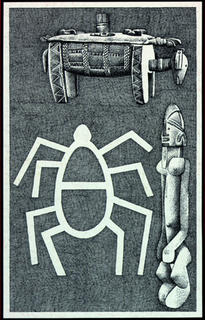
Among the dandy pieces of mail awaiting me are two periodicals. The first is the latest William Carlos Williams Review (25.1), containing my review of Barry Ahearn’s edition of the Louis Zukofsky/William Carlos Williams correspondence, a book well worth reading if you’re able to get past all those notes of “Sorry, Louis, we’ll have to cancel lunch next week” and “Let’s get together this Thursday…” The second is the latest Chicago Review (51.1/2), which contains a major section saluting one of my favorite poets, Christopher Middleton, along with the usual mix of interesting poetry – Elizabeth Willis, Philip Jenks, John Wilkinson, Keston Sutherland, the late Gustaf Sobin, and Camille Martin, among others – and nonfiction (Peter O’Leary on the Levertov/Duncan letters is sure to be good).
It also contains my wee set of “epitaphs” for Guy Davenport, who died of lung cancer this past January in Lexington, Kentucky, where he’d lived and taught for some forty years. Those epitaphs are my own clumsy attempt at a Davenport pastiche, in honor of Guy himself, who I think got the short end of the stick in some quarters of the blogosphere. I mean Ron Silliman’s brief notice of his passing, which boils down to “I never dug his work and suspected him of being a fascist.”
I first encountered Guy’s essays when I was an undergraduate, maybe a junior or sophomore, and my poetry professor Tom Gardner, with whom I was reading Pound and Duncan, handed me his copy of The Geography of the Imagination and said, “I think you might enjoy these essays.” To say the least. It wasn’t just that Guy seemed incapable of writing a dull sentence (as opposed to most literary critics, who are incapable of writing one that isn’t): the essays in that collection literally opened my eyes to a whole world of writers I hadn’t known existed, who never set foot on the university syllabi back in the mid-eighties. Of course he wrote eloquently on Pound, Eliot, Joyce, Eudora Welty, and most of the major modernists: but he set me to reading Ronald Johnson (I’ll wager half of those who read Johnson now came to him through Guy’s essays – back in the mid-eighties, probably 90%), Charles Olson, Ian Hamilton Finlay, Louis Zukofsky, and Jonathan Williams, looking at Pavel Tchelichev and Ralph Eugene Meatyard, listening to Charles Ives. Guy had the knack of writing about the most recondite artworks and making them seem positively seductive
I shared maybe forty or fifty hours with Guy over the course of a decade or more. My MO was simple: I’d attend the 20th Century Literature conference at the U of Louisville, then drive over to Lexington and spend a long evening in front of his fire, smoking and talking late into the night. His house was much like its photographs on his dust jackets: cozy and comfortable, packed to the rafters with books (there was a ceaseless flow of books into the place – he once told me he received an average of five books a day: review copies, inscribed tokens, whatnots), every available inch of wall space covered with paintings, photographs, drawings. He had books in every room of the house except the bathroom and the upstairs bedroom he used as a studio. (One of his studios – the garage had been converted into a lovely, Scandinavian workspace as well.) He was a lovely ranconteur, with an endless fund of anecdotes on the most out-of-the-way subjects. And of course he poured all of his knowledge into his writings.
If Guy had a governing obsession, it was freedom: that human beings should be free from oppression, from want, from prejudice, from sexual repression, from ignorance, so that they might develop into the beauty-loving creatures that they naturally are. Some of the early Marx might serve as commentary on his stories. At least one other writer, Samuel R. Delany, sees the utopian potential in Davenport’s work. In the Appendix to Return to Nevèrÿon, Delany writes, “Within what describes for me, then, an arena of almost total dispassion, Davenport brings me again and again to breath-lost awe at the beauties he manages to construct in that lucid, glimmering language field.”
Guy was a life-long Democrat, long after the South in which he grew up and lived swung to the Republican right. He had no patience with race-baiting, with anti-Semitism. (He was as philo-Semitic as any Goy I’ve ever known: one Orthodox scholar obtained a dispensation to visit Guy on the Sabbath by explaining to his rabbi that his writer friend was a true tzadik.) For better or worse, Guy was one of those readers who could habitually separate out Pound’s virtues – his peerless poetic ear, his keen eye for literary and artistic beauties across history – from his poisonous prejudices, which for Guy were simply “whacky.”
It’s perhaps a steady diet of Guy’s writing that has condemned me, for better or worse, to being a “late modernist” rather than a “post-avant” poet. (If that’s what I am – I suppose I should give it some thought. Nah.) But his writing has taught me so much, and given me so much steady pleasure, that I can’t really bring myself to regret it.
No comments:
Post a Comment